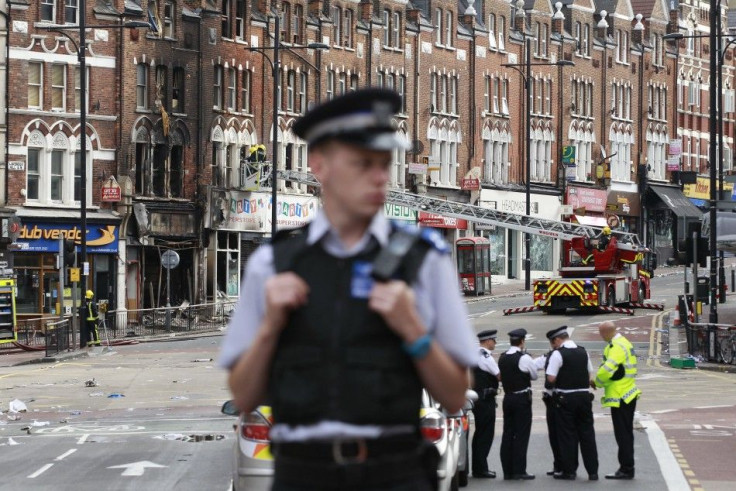London Riots: How BlackBerry Messenger (BBM) Enabled Destruction

Technology is quickly changing the world we live in, and nothing perhaps has summed that up more than the London riots -- where up-to-the-minute rallying and looting has often been directed by organization through BlackBerry Messenger, or BBM.
Because BlackBerry Messenger can be untraceable, unlike Twitter or Facebook, rioters have relied upon BBM in covert fashion, staying one step ahead of police via the social networking tool. It's a grisly reality that's emerged from the ongoing UK riots, resulting in deaths, destruction and chaos.
Never before have we seen the relatively new connectivity tools like Twitter and BlackBerry Messenger play such a big role among activists.
But today's generation of youth is well-versed in social media, often gaining a Twitter account before they reach puberty. They may not have jobs, or hope, but they most certainly have accounts with Facebook, Twitter and even BlackBerry Messenger -- and they aren't afraid to use them.
Slipping out in the night armed with smartphones, gangs and angry youths have found a uniting weapon worthy of battle against the cause with social media.
Technology Web site TNT reported that social media as a tool for rioters is so severe that the digital advisor for London Mayor Boris Johnson is calling for BlackBerry Messenger to be closed down because of the service's role in the riots.
The advisor, Mike Butcher, reportedly says it is "unbelievable" that BlackBerry Messenger, believed to have helped looters and rioters organize, hasn't been closed down.
Butcher reportedly described the BlackBerry Messenger service as "text messaging with steroids."
BlackBerry Messenger isn't the only social media tool that's being used by rioters to organize. Twitter has played such a prominent role that many people called for all "tweets" related to the rioting to be banished. Twitter has responded by referring to a blog post written by its co-founder Chistopher "Biz" Stone earlier this year.
"The Tweets Must Flow," said Stone's post.
Thus, even in light of how Twitter and other connectivity tools are being used in the UK riots, Twitter isn't interested in bringing them to a halt.
"Our goal is to instantly connect people everywhere to what is most meaningful to them," said a Twitter spokesman, speaking with The Telegraph. "For this to happen, freedom of expression is essential."
Twitter's spokesman declined to reveal if the company was working with London police to help locate people who have used the service to organize looting and riots. But police are reportedly now reading all tweets to help bring order to the rioting. And they aren't afraid to bring forth criminal charges.
Greater Manchester Police, for instance, said a Wigan man has been arrested on suspicion of using social media to incite disorder.
BlackBerry Messenger has been the communications tool of choice for many rioters, however. "It appears to have acted as their private, encrypted social network over the past two nights' violence," wrote Emma Barnett, digital media editor for The Telegraph.
Indeed, BlackBerry Messenger has been pinpointed as one of the primary mediums in London used by rioters to communicate and organize. The maker of BlackBerry smartphones and the parent company of BBM -- Canada-based Research in Motion has already come under attack for working with British police in the riots, however.
RIM's Inside BlackBerry blog was hacked into after the company apparently agreed to cooperate and help British police forces. On Tuesday afternoon, the blog remained down as a group called "TeaMpOisoN" claimed responsibility.
"You Will_NOT_assist the UK Police because if u do innocent members of the public who were at the wrong place at the wrong time and owned a blackberry will get charged for no reason at all, the Police are looking to arrest as many people as possible to save themselves from embarrassment...if you do assist the police by giving them (information)...you will regret it...," the group said in a statement, according to The Next Web.
Leading social media services including Twitter and Facebook and others have been the focus of police in the U.S. in the past year as officials say they are increasingly being used to create potentially dangerous "flash mobs."
The July 4 fireworks display in the Cleveland suburb of Shaker Heights, for instance, became a disorderly event as 1,000 teenagers mobilized through social networking sites, eventually starting fights and disrupting what was supposed to be a family event.
Flash mobs began in 2003 as peaceful attempts at public display. Originally, they were organized primarily through text messaging. But now, many U.S. cities including Cleveland, Philadelphia and others have condemned the behavior of flash mob gathering.
In the London riots, gangs are using BlackBerry Messenger messages transmitted through a private network to remain one step ahead of police.
"Everyone from all sides of London meet up at the heart of London (central) OXFORD CIRCUS!!!, Bare SHOPS are gonna get smashed up so come get some (free stuff!!!)," one BlackBerry Messenger message in London reportedly read.
© Copyright IBTimes 2024. All rights reserved.





















